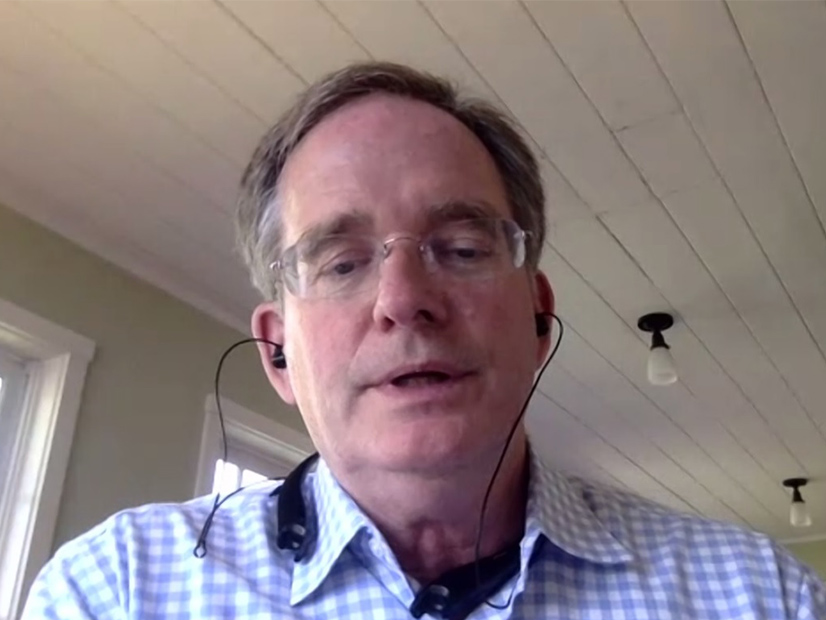Meeting 2050 emissions goals in the U.S. will require a “swift, maximum certain transition out of all fossil fuels, including natural gas,” in the building sector, former New York Public Service Commission Chair John Rhodes said Thursday.
Buildings account for about 30% of U.S. emissions directly, but that number is even higher with the indirect emissions of electricity from the current generation mix.
“As we clean up buildings … it’s really an appreciating asset, because the more electricity becomes the fuel for buildings, and the more electricity decarbonizes, you get a double reinforcing effect,” Rhodes said during a Columbia University webinar, “Getting the Gas Sector’s Energy Transition Underway.”
Transitioning buildings fully to electricity, according to Rhodes, must be an immediate-term priority that focuses on practical alternatives to fossil fuel use for cooking and space and water heating.
“For many building types — especially for new construction but also for some retrofits — a lot of electrification is practical now,” he said. “There’s clearly a justified call for marching in the direction of going strong now.”
There is also a need for solution development that goes beyond energy efficiency, he said.
“Efficiency for natural gas typically means another, albeit more efficient, natural gas appliance to take the place of an expiring current one,” he said. Demand response for gas service, he added, is “practically nonexistent” and “heat pumps need further development.”
Rhodes also said that renewable natural gas and hydrogen are “not ready for prime time.”
As potential resources, they deserve meaningful R&D investment he said, but they cannot be the justification for building new infrastructure.
The best ways to bridge gaps in the fossil fuel transition will be policy support and targeted investments, he said.
“Policy support should be our best, most pragmatic assessment of the portfolio, whether it’s rebates, subsidized financing, organizing the markets to boost uptake, addressing regulations that impede electrification [or] developing the workforce,” he said.
At the same time, regulations and standards should minimize natural gas infrastructure development.
“We need to get to the point where, not only are we doing things through the energy regulatory utility instruments, but also through building codes and building permits,” he said.
Regional Studies
Regulators in California, New York and Massachusetts opened investigations on the transition from gas last year, and Washington State is working on a study plan.
“This year, Gov. [Jay] Inslee signed legislation that directs the [Washington Utilities and Transportation Commission] to initiate a study looking at how we can reduce emissions in the natural gas sector consistent with [the state’s] carbon reduction targets,” Commission Chair David Danner said during the webinar. The study is due in mid-2023.
Decarbonizing a carbon-based industry like natural gas is a unique challenge, he said.
While the commission’s study is far from ready to provide insights into that challenge, Danner sees two immediate priorities.
First, states need to review the policies that promote the use of natural gas or give an advantage to natural gas over other fuels, he said.
Many states have codified affordable natural gas service for their citizens, and that has created conflict with new climate policies. Washington, however, changed its policy to say that its citizens are entitled to “affordable energy,” Danner said.
Subsidies that come from existing natural gas customers to pay for connecting new customers also need reconsideration. Developers, Danner said, should pay the full cost of gas connections.
“Let’s see how natural gas fares in the market and give alternatives like electric appliances and heat pumps a shot,” he said.
Second, states need to reduce emissions in the existing gas system.
“We have to be better at plugging leaks in the gas system,” he said, adding that Washington’s utilities are pursuing a pipeline replacement plan that has proven effective.
Tension is inevitable when states have a dual responsibility of reducing investments in fossil fuel infrastructure and safeguarding existing infrastructure, he said. “We are not going to interrupt pipeline replacement plans because safety is too important for us to really slow down on, but that is a conundrum that we have to face going forward.”
Massachusetts has been trying to deal with the conundrum since a 2018 gas explosion killed one man and injured two dozen people in Merrimack Valley.
About a year after the accident, Brookline, Mass., passed an ordinance that prohibited new or restored buildings from having natural gas service.
Attorney General Maura Healey, however, concluded that the ordinance was not consistent with Massachusetts law. Healey decided that the state needed a comprehensive plan for natural gas use as the state transitions to net zero emissions.
Having towns address gas service “piecemeal” concerned the AG’s office, Rebecca Tepper, energy and environment bureau chief at the AG’s office, told the webinar. “We urged the [Department of Public Utilities] to implement a plan to ensure that the natural gas transition happens in a way that is safe, reliable and fair for all customers.”
Last October, the DPU issued an order to open an investigation into the future of natural gas. The order directs the state’s local gas distribution companies to submit a proposal by March 2022 with recommendations and plans for “helping the commonwealth achieve its 2050 climate goals.”
While that investigation is going on, the AG’s office is thinking about regulatory changes that Tepper said “might be necessary” for natural gas planning. To support its thinking on those changes, the AG’s office is holding a virtual think tank on June 10 and June 17. Participants will discuss forecasting; continued investment in gas pipeline repair, replacement and new infrastructure; and whether gas and electric planning should be integrated.




